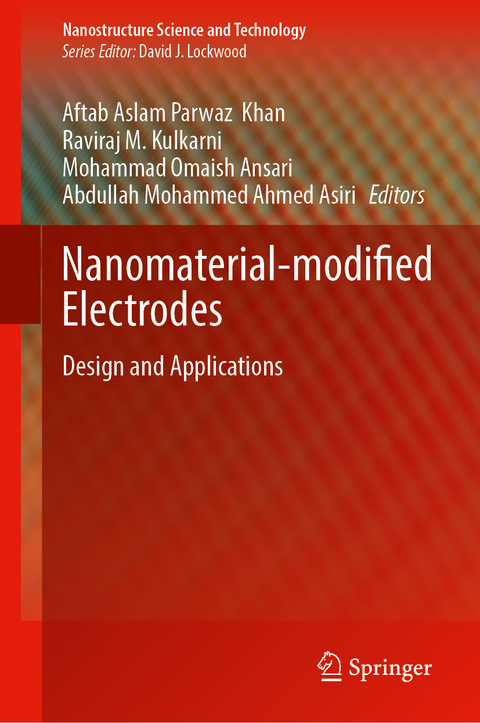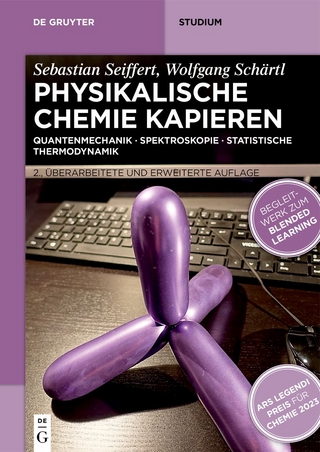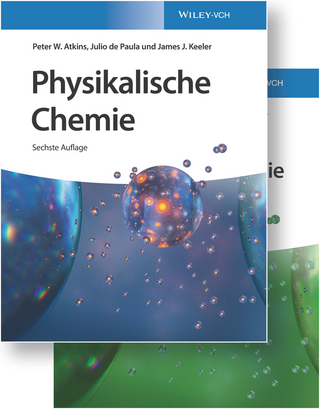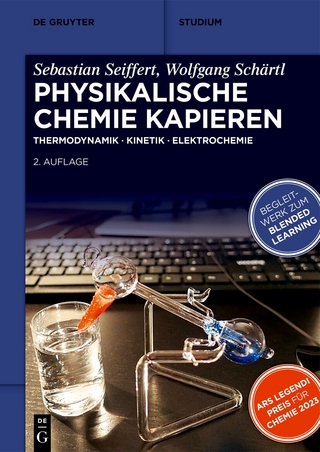
Nanomaterial-Modified Electrodes
Springer International Publishing (Verlag)
978-3-031-67175-3 (ISBN)
Dr. Aftab Aslam Parwaz Khan is Associate Professor in the Center of Excellence for Advanced Materials Research, at King Abdulaziz University. Dr. Khan has been involved in global research collaborations for chemical science and materials chemistry. Despite having written six books, 30 chapters, and more than 200 research papers, he still continues to write. Currently, he is a member of the review Editorial Board for frontier chemistry (IF: 5.2) and doing special issues for the journal Nanomaterials (IF: 5.07). He is about to be a reviewer for several renowned international journals, such as Nature, ACS, RSC, WILEY, Elsevier, Springer, Bentham, IOP, and Frontiers. Khan was recently honored by the Vice Chancellor of King Abdulaziz University, Saudi Arabia for his book publication in Elsevier. More than 20 international conferences/workshops and 30 research projects has been completed. His research encompasses all aspects of polymer nanomaterials based on metal ions, metal oxides, carbon nanotubes, graphene oxide, and photocatalytic materials. Synthesis and characterization, as well as applications include chemical sensing, environmental remediation, and the design and synthesis of advanced photocatalytic materials drug delivery systems for mechanistic and interaction studies using a wide range of spectroscopic techniques and thermodynamic parameters.
Prof. Raviraj M. Kulkarni is presently working as a Professor of Chemistry and Coordinator at the Centre for Nanoscience and Nanotechnology, KLS Gogte Institute of Technology, Udyambag, Belagavi, Karnataka, INDIA 590008. He was awarded a Ph.D. in Chemistry from Karnatak University Dharwad, India in 2003. He worked as a Postdoctoral fellow at Katholieke Universiteit Leuven Belgium (2003-2005), a Visiting Fellow at Tata Institute of Fundamental Research, Mumbai (2005-2006), and Postdoctoral Fellow at the University of Alberta, Edmonton Canada (2006-2007). He has published more than 110 research papers in various peer-reviewed international journals and published 5 book chapters. He has successfully guided 4 Ph.D. students and 11 M. Tech students. He is also Editorial Board Member and reviewer of many international journals of high repute. He is the recipient "Young Scientist Award" with seed money and the "Award for Research Publication" by VGST Govt. of Karnataka, INDIA. His research interests include all aspects of nanomaterials, electrochemical sensors, photocatalysis, electrode development, spectroscopy, environmental chemistry, and kinetics.
Prof. Abdullah Mohammed Ahmed Asiri is Professor in the Chemistry Department - Faculty of Science -at King Abdulaziz University. Ph.D. (1995) From University of Walls College of Cardiff, U.K. on tribochromic compounds and their applications. He is currently the chairman of the chemistry department, at King Abdulaziz University and also the Director of the Center of Excellence for Advanced Materials Research. He is HiCi researcher in 2018 list. Director of Education Affair Unit-Deanship of Community Services. Member of Advisory Committee for advancing materials, (National Technology Plan, King Abdul Aziz City of Science and Technology, Riyadh, Saudi Arabia). His interests are focused on color chemistry, synthesis of novel photochromic and thermochromic systems, synthesis of novel colorants and coloration of textiles and plastics, molecular modeling, applications of organic materials into optics such as OEDS, High-performance organic Dyes and pigments, new applications of organic photochromic compounds in new novelty, organic synthesis of heterocyclic compounds as a precursor for dyes, synthesis of polymers functionalized with organic dyes. Preparation of some coating formulations for different applications, photodynamic thereby using Organic Dyes and Pigments Virtual Labs and Experimental Simulations. He is a member of the Editorial board of the Jo
An overview of nanomaterial-modified electrodes.- Nanomaterials for electrode fabrication: properties and synthesis.- Modified TiO2 nanomaterial-based electrodes for biosensors.- Modified Graphene-based electrodes for sensing biomolecules and pharmaceutical compounds.- Modified Carbon nanotube-based electrodes for sensing biomolecules and pharmaceutical compounds.- Modified ZnO nanomaterials electrodes for monitoring of environmental contaminants.- Modified nanomaterials-based electrode for the detection of heavy metals in water.- Immobilization techniques in the fabrication of nanomaterial-based electrodes for biosensing.- Polymer nanocomposites-based electrodes for the detection of pharmaceutical compounds.- Gold and silver nanoparticle-based electrodes for sensing biomolecules and pharmaceutical compounds.- Nanomaterial-modified electrodes for glucose sensing.- Nanomaterials modified electrodes for nucleic acid biosensing.- Nanomaterials based screen printed electrodes for biosensing and pharmaceutical analysis.- Nanomaterials as ink for paper based flexible electrodes for biosensing, pharmaceutical analysis and environmental monitoring.- Lab-on-chip based electrochemical sensors for biosensing, pharmaceutical analysis and environmental monitoring.- Magnetic nanomaterial-modified electrodes.- 2D layered nanomaterial-modified electrodes for the detection of environmental contaminants.- 1D nanomaterial-modified electrodes for pharmaceutical analysis.- Nanomaterials modified electrodes for the detection of antibiotics in water.- Conclusions.
| Erscheinungsdatum | 10.10.2024 |
|---|---|
| Reihe/Serie | Nanostructure Science and Technology |
| Zusatzinfo | XIII, 306 p. 56 illus., 48 illus. in color. |
| Verlagsort | Cham |
| Sprache | englisch |
| Maße | 155 x 235 mm |
| Themenwelt | Naturwissenschaften ► Chemie ► Physikalische Chemie |
| Technik ► Maschinenbau | |
| Schlagworte | biosensing • Environmental Engineering • Modified electrodes • nanomaterials • Pharmaceutical science |
| ISBN-10 | 3-031-67175-9 / 3031671759 |
| ISBN-13 | 978-3-031-67175-3 / 9783031671753 |
| Zustand | Neuware |
| Haben Sie eine Frage zum Produkt? |
aus dem Bereich


